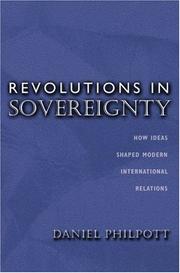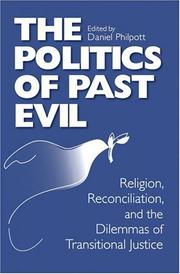| Listing 1 - 10 of 20 | << page >> |
Sort by
|

ISBN: 069105746X 0691057478 9781400814541 1400814545 9780691057460 9780691057477 Year: 2001 Publisher: Princeton, N.J. Princeton University Press
Abstract | Keywords | Export | Availability | Bookmark
 Loading...
Loading...Choose an application
- Reference Manager
- EndNote
- RefWorks (Direct export to RefWorks)
International relations. Foreign policy --- Sovereignty --- International relations --- Souveraineté --- Relations internationales --- Sovereignty. --- Souveraineté
Book
ISBN: 9780199827565 Year: 2012 Publisher: Oxford Oxford university
Abstract | Keywords | Export | Availability | Bookmark
 Loading...
Loading...Choose an application
- Reference Manager
- EndNote
- RefWorks (Direct export to RefWorks)
General ethics --- Religious studies --- Sociology of law --- Legal theory and methods. Philosophy of law --- Polemology --- Abrahamic religions --- Reconciliation --- Restorative justice --- Religions --- Religious aspects
Book
ISBN: 0190248351 9780190248352 Year: 2015 Publisher: New York (N.Y.): Oxford university press,
Abstract | Keywords | Export | Availability | Bookmark
 Loading...
Loading...Choose an application
- Reference Manager
- EndNote
- RefWorks (Direct export to RefWorks)
Reconciliation --- Restorative justice --- Abrahamic religions

ISBN: 9780268038908 0268038902 9780268038892 0268038899 Year: 2006 Publisher: Notre Dame (Ind.): University of Notre Dame press,
Abstract | Keywords | Export | Availability | Bookmark
 Loading...
Loading...Choose an application
- Reference Manager
- EndNote
- RefWorks (Direct export to RefWorks)
Truth commissions --- Reconciliation --- Reconciliation --- Restorative justice --- Crimes against humanity --- Transitional justice
Book
ISBN: 9780190908188 0190908181 Year: 2019 Publisher: New York, NY Oxford University Press
Abstract | Keywords | Export | Availability | Bookmark
 Loading...
Loading...Choose an application
- Reference Manager
- EndNote
- RefWorks (Direct export to RefWorks)
Liberty --- Freedom of religion --- Religious aspects --- Islam
Book
ISBN: 0268101736 0268101728 9780268101725 9780268101732 9780268101701 0268101701 9780268101701 9780268101718 026810171X Year: 2017 Publisher: Notre Dame
Abstract | Keywords | Export | Availability | Bookmark
 Loading...
Loading...Choose an application
- Reference Manager
- EndNote
- RefWorks (Direct export to RefWorks)
Liberalism --- Christianity and politics --- Religious aspect --- Catholic Church. --- Catholic Church --- History.
Book
ISBN: 1283134667 9786613134660 1400824230 Year: 2001 Publisher: Princeton : Princeton University Press,
Abstract | Keywords | Export | Availability | Bookmark
 Loading...
Loading...Choose an application
- Reference Manager
- EndNote
- RefWorks (Direct export to RefWorks)
How did the world come to be organized into sovereign states? Daniel Philpott argues that two historical revolutions in ideas are responsible. First, the Protestant Reformation ended medieval Christendom and brought a system of sovereign states in Europe, culminating at the Peace of Westphalia in 1648. Second, ideas of equality and colonial nationalism brought a sweeping end to colonial empires around 1960, spreading the sovereign states system to the rest of the globe. In both cases, revolutions in ideas about legitimate political authority profoundly altered the "constitution" that establishes basic authority in the international system. Ideas exercised influence first by shaping popular identities, then by exercising social power upon the elites who could bring about new international constitutions. Swaths of early modern Europeans, for instance, arrived at Protestant beliefs, then fought against the temporal powers of the Church on behalf of the sovereignty of secular princes, who could overthrow the formidable remains of a unified medieval Christendom. In the second revolution, colonial nationalists, domestic opponents of empire, and rival superpowers pressured European cabinets to relinquish their colonies in the name of equality and nationalism, resulting in a global system of sovereign states. Bringing new theoretical and historical depth to the study of international relations, Philpott demonstrates that while shifts in military, economic, and other forms of material power cannot be overlooked, only ideas can explain how the world came to be organized into a system of sovereign states.
Book
ISBN: 9781400824236 Year: 2010 Publisher: Princeton, NJ
Abstract | Keywords | Export | Availability | Bookmark
 Loading...
Loading...Choose an application
- Reference Manager
- EndNote
- RefWorks (Direct export to RefWorks)
Book
ISBN: 9780199364862 9780199364879 0199364877 0199364869 Year: 2014 Publisher: Oxford Oxford University Press
Abstract | Keywords | Export | Availability | Bookmark
 Loading...
Loading...Choose an application
- Reference Manager
- EndNote
- RefWorks (Direct export to RefWorks)
"All over the world the practice of peacebuilding is beset with common dilemmas: peace versus justice, religious versus secular approaches, individual versus structural justice, reconciliation versus retribution, and the harmonization of the sheer multiplicity of practices involved in repairing past harms. Progress towards the resolution of these dilemmas requires far more than reforming institutions and practices but rather clear thinking about the more basic questions: What is justice? And how is it related to the building of peace? The twin concepts of reconciliation and restorative justice, both involving the holistic restoration of right relationship, contain not only a compelling logic of justice but also great promise for resolving peacebuilding's tensions and for constructing and assessing its institutions and practices. This volume furthers this potential by developing not only the core content of these concepts but also their implications for accountability, forgiveness, reparations, traditional practices, human rights, and international law. While the volume's central orientation is theory, it contains much of interest to a wide range of scholars as well as practitioners. It is both interdisciplinary and accessibly written. It situates its analysis in countries as diverse as South Africa, El Salvador, Canada, and East Timor and in the work of institutions and communities such as the United Nations, the Catholic Church, various indigenous communities, and the international law community. It contains essays by leading scholars of restorative justice, international law, transitional justice, political philosophy and theology"--
Restorative justice --- Justice, Administration of --- Reconciliation --- Peace-building
Book
ISBN: 9781108425308 1108425305 9781108441766 9781108348331 1108441769 1108687008 1108348335 1108597440 Year: 2018 Publisher: Cambridge Cambridge University Press
Abstract | Keywords | Export | Availability | Bookmark
 Loading...
Loading...Choose an application
- Reference Manager
- EndNote
- RefWorks (Direct export to RefWorks)
The global persecution of Christians is an urgent human rights issue that remains underreported. This volume presents the results of the first systematic global investigation into how Christians respond to persecution. World-class scholars of global Christianity present first-hand research from most of the sites of the harshest persecution as well as the West and Latin America. Their findings make clear the nature of persecution, the reasons for it, Christian responses to it - both non-violent and confrontational - and the effects of these responses. Motivating the volume is the hope that this knowledge will empower all who would exercise solidarity with the world's persecuted Christians and will offer the victims strategies for a more effective response.
Persecution --- Christians --- Freedom of religion --- 342.731 --- 342.731 Vrijheid van godsdienst. Gewetensvrijheid --- Vrijheid van godsdienst. Gewetensvrijheid --- Freedom of worship --- Intolerance --- Liberty of religion --- Religious freedom --- Religious liberty --- Separation of church and state --- Freedom of expression --- Liberty --- Religious adherents --- Religious persecution --- Atrocities --- Law and legislation --- Persecutions --- Persecution. --- Christians. --- Freedom of religion.
| Listing 1 - 10 of 20 | << page >> |
Sort by
|

 Search
Search Feedback
Feedback About UniCat
About UniCat  Help
Help News
News